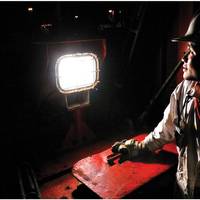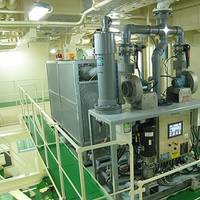Shore Leave: Re-think on Balancing Security, Seafarer Rights

Before port states became hyper-sensitive to security issues, shore leave was natural part of a seafarer’s life. You worked long and hard hours at sea, often for extended periods of time on long voyages. When the ship reached port, you went ashore and decompressed, connecting with family and friends. That and much more changed after the terrorist attacks of 11 September 2001. The IMO adopted the International Ship and Port Facility Security (ISPS) Code mandating enhanced security onboard vessels subject to the SOLAS Convention.
Ecochlor BWMS Gets USCG AMS Acceptance
Ecochlor, Inc. receives US Coast Guard Alternative Management System (AMS) acceptance for its full line of ballast water management systems (BWMS). AMS acceptancel allows ship operators to use an Ecochlor ballast water management system in US waters to effectively manage their ballast discharges. It is also an indication that Ecochlor’s BWMS are up to the challenge of successfully completing the United States Coast Guard (USCG) review. AMS approval allows ship operators to use ballast water management systems that have been type approved outside the United States for up to five years, while the vendor of the system proceeds through the USCG type approval application process.
Balpure BWTS Receives USCG Certification

The IMO Type-Approved Balpure ballast water treatment system from Severn Trent De Nora has become one of the first ballast water treatment technologies to receive the United States Coast Guard’s (USCG) Alternate Management System (AMS) certification. AMS certification identifies an IMO Type-Approved system that meets the USCG requirements. Ships are required to have onboard ballast water treatment systems that prevent invasive species from being shipped into U.S. waters. The AMS certification has specifically approved the use of BALPURE…
Catastrophic Equipment Failures of VFD and HF Systems
Commercial and military users of electric propulsion systems have experienced failures of the variable frequency drive (VFD) and harmonic filter (HF) systems because the system design, including the VFD, did not have adequate self-monitoring and protection. On a ship, a variable-frequency drive (VFD) can be used to control the speed and direction of rotational motors, such as pumps, propellers and azipod systems. In some cases, these failures have resulted in catastrophic equipment failures causing arcing, fire and explosions of capacitors. In September of 2010, the Cunard Carnival cruise ship RMS Queen Mary 2 (QM2) was underway in the Mediterranean when an explosion occurred in the aft main switchboard room resulting from the failure of one of 12 capacitors in a harmonic filter…
USCG Completes Security Review LNG Proposal
The U.S. Coast Guard issued a Press Release stating that it completed a preliminary review of a waterway security assessment regarding the proposed Crown Landing LNG facility on the Delaware River. The assessment and the USCG review will be forwarded to the Federal Energy Regulatory Commission (FERC) for consideration. Source: HK Law
Confused Seas
Navigating through U.S. By Dennis L. Holland & Knight, Washington, D.C. The U.S. Maritime Transportation Security Act (MTSA) imposes various maritime security requirements on operating in waters subject to the jurisdiction of the United States. Maritime security regulations promulgated by the U.S. Coast Guard implement some (but not all) of the MTSA requirements and impose some additional requirements. In other words, Congress has imposed various requirements on the owners and operators of ships navigating waters of the United States and the U.S. Coast Guard has not provided full guidance on how to comply with those legislative mandates.





